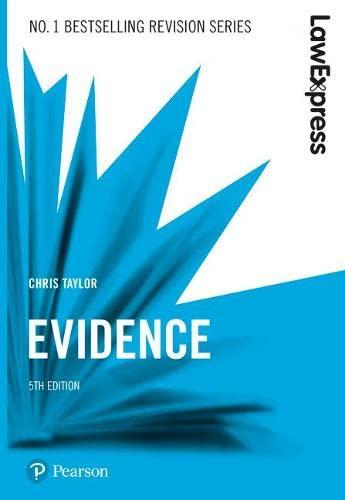Question
Thomas, a tramway passenger in New South Wales was injured in a collision with another tram, which occurred after the driver collapsed at the controls.
Thomas, a tramway passenger in New South Wales was injured in a collision with another tram, which occurred after the driver collapsed at the controls. Thomas, as plaintiff, argued that the collision could have been avoided if the tramway authority had fitted the tram with a system known as 'dead man's handle', a system in use on New South Wales' trains. This would have stopped the tram and avoided the accident. The device had been rejected by the tramway authorities because it was felt that it could cause drivers to become tired, irritated and inefficient. There was no evidence of any similar device in use on two-man trams anywhere in the world. After suffering injury in the collision and receiving outpatient treatment Thomas then went home to rest. While at home, Thomas receives a call from the manager of his shop located in downtown Sydney that two individuals have been injured while in the premises - one individual was a paying customer of the shop while the other individual was merely passing through the premises while enroute to school. Both individuals are now looking to claim against Thomas' business for injuries suffered in the premises and Thomas' manager would like to understand whether there is any difference in the level of duty of care owed to the individual who was a paying customer versus the other individual who was merely passing through the premises.
My question is
1. Will Thomas succeed in his claim against the tramway authority? Explain your reasoning generally and by reference to Mercer v Commissioner for Road Transport & Tramways (NSW) (1936) 56 CLR 580.
2.Having established duty, breach and damage, is the tramway authority liable for all the damage suffered by Thomas? Discuss.
3.Does Thomas' business owe a higher duty of care to the individual who was a paying customer in comparison to the other individual who was merely passing through? If you think that a contractual entrant is owed a higher duty of care, or a non-contractual entrant is owed a lower duty of care, explain why. Please make reference to Australian Safeway Stores Pty Ltd v Zaluzna [1987] HCA 7
Step by Step Solution
There are 3 Steps involved in it
Step: 1

Get Instant Access to Expert-Tailored Solutions
See step-by-step solutions with expert insights and AI powered tools for academic success
Step: 2

Step: 3

Ace Your Homework with AI
Get the answers you need in no time with our AI-driven, step-by-step assistance
Get Started


